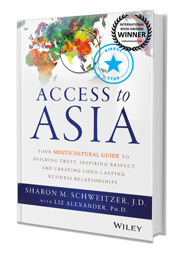In Beijing, China, a blue and white piece of Texas porcelain has center stage on the office coffee table of Madam Nie Meisheng. She’s the former Chairwoman of the Chinese Real Estate Chamber of Commerce. When I purchased that eye catching, beautifully scalloped ‘made-in-Texas’ tray it was done with the intent that it has a place of honor. And it does as every visitor invited for tea sees that gorgeous Texas tray.
Showing gratitude is a rewarding and wonderful experience. When done ethically and tastefully, it solidifies professional relationships and scores extra points in global business ventures.
There are many cultural nuances when it comes to the art of gift giving in the U.S. and internationally. Access to Asia, written by my co-author Liz Alexander, Ph.D. and me, is the 2017 New York Big Book Award Multicultural Nonfiction Winner, and provides a comprehensive guide to the cross-cultural implications of gift giving in Asia, as well as a practical framework of effective strategies for business leaders and managers.
As part one of several global gift giving posts and in honor of November’s National Gratitude Month, let’s explore how to give the most appropriate and heartfelt gift to your global business partners to show your gratitude.
United States
- Appropriate corporate gifts include coffee table books, regional guides, and office or desk accessories. Inappropriate gifts are cash, personal clothing, or anything hygiene related like body spray or deodorant. It’s important to do some research on your recipient’s health, belief system, religion and personal habits before gifting any candy, food, sweets, or liquor. These gifts are given for holidays, retirements, birthdays, marriages or promotions. Buy moderately priced gifts. Send a thank-you note within 48 hours.
East Asia
- China: When exchanging gifts, keep in mind that these are exchanged at initial and later meetings. Use both hands to present and to receive gifts. Appropriate gifts for men and women include small office items such as pens, trays, bowls; cosmetics and silk scarves for women. Inappropriate gifts include clocks, cranes, sharp objects, and handkerchiefs.
- Japan: Gifts, or omiyage, are part of an important culture to express gratitude to business counterparts. Appropriate gifts include regional gifts from gift shops. Inappropriate gifts include company logo items, sharp objects, and gifts easily purchased in Japan. Wrapping must be done professionally and the overall gift quality is important. Unless the gift is to be shared with everyone, it’s polite to be unwrapped in private.
- South Korea: Appropriate business gifts include a USB flash drive, high-quality pens, lanyards, desk accessories, and clocks. Inappropriate gifts include any sharp items, red ink, shoes and handkerchiefs. Professionally wrapping gifts is important.
South Asia
- India: Appropriate gifts include high-quality pens or European chocolates. Inappropriate gifts are items easily bought in India, or gifts wrapped in black or white. Be cautious about giving liquor. Indians love giving gifts, so don’t be surprised if you receive a gift.
Southeast Asia
- Myanmar: Appropriate gifts include pens, golf balls, and liquor – especially whisky. Gifts are often expected on three occasions: leaving employment, getting married, or having a baby. Gifts can often be declined with a saying, “You should not have gone to so much trouble.” In response, reply that it is your honor to present the gift.
- Singapore: In Singapore, business-related gift giving is not a common practice. However, if you’re invited to someone’s home, bring a small gift. Do some research on culture specific customs of ethnicities in the region including Bumiputera, Chinese, and Indian to present the most appropriate gift.
Incorporate these intercultural guidelines with your Asian and U.S. American counterparts to foster strong relationships. If you’re interested in gift-giving in other global regions, learn about different cultural implications of other continents in this gift-giving series.
Sharon Schweitzer and Sunny Kim co-wrote this post. Sharon Schweitzer, J.D., is an award-winning entrepreneur, cross-cultural trainer, and the founder of Access to Culture. In addition to her accreditation in intercultural management from the HOFSTEDE Centre, she serves as a Chinese Ceremonial Dining Etiquette Specialist in the documentary series Confucius was a Foodie, on Nat Geo People. She is regularly quoted by BBC Capital, Investor’s Business Daily, and Fortune. Her Amazon #1 Best Selling book in International Business, Access to Asia: Your Multicultural Business Guide, (3rd printing), was named to Kirkus Reviews’ Best Books of 2015. She’s a winner of the British Airways International Trade Award at the 2016 Greater Austin Business Awards.
Sunny Kim is a Fall 2017 Cross-Cultural Communication intern with Access to Culture. She is currently a junior journalism student at the University of Texas at Austin with a minor in Korean language and certificate in business. She is also the founder and president of UT Asian American Journalists Association. Her main focus is storytelling people’s diverse experiences relating to race and culture. Connect with her on Linkedin.


Leave A Comment